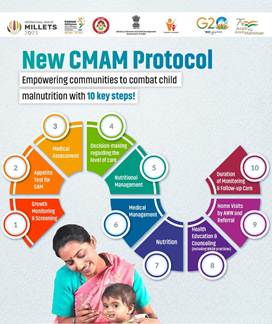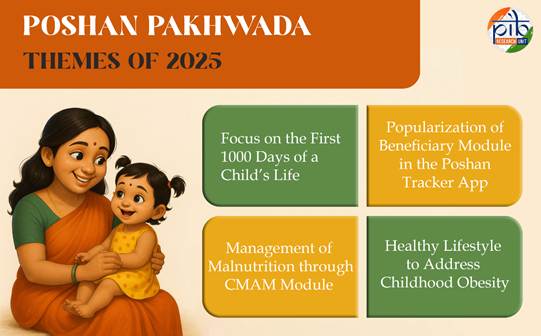On March 8, 2018, India took a bold step toward a healthier future with the launch of Poshan Abhiyaan in Jhunjhunu, Rajasthan. This national initiative, also known as the National Nutrition Mission, aims to tackle malnutrition head-on by improving the health of children aged 0-6 years, adolescent girls, pregnant women, and lactating mothers. Now, as the country prepares for the 7th edition of Poshan Pakhwada from April 8 to April 23, 2025, the mission continues to rally communities, harness technology, and unite government efforts to create a malnutrition-free India.
What makes Poshan Abhiyaan so vital? Why does it matter to millions of families across the country? Let’s dive into the details of this transformative program, its goals, and what the upcoming Poshan Pakhwada has in store.
What is Poshan Abhiyaan?
Poshan Abhiyaan brings together various government ministries to address malnutrition in a coordinated way. The program doesn’t create new schemes but strengthens existing ones by ensuring they work together seamlessly. Led by the Ministry of Women and Child Development (MWCD), it focuses on reducing stunting, undernutrition, anemia, and low birth weight among children while supporting the health of pregnant women and new mothers.
The initiative rolled out in phases:
- Year 1: Covered 315 districts.
- Year 2: Expanded to 235 more districts.
- Year 3: Reached all remaining districts, achieving nationwide coverage.
By uniting efforts across health, education, sanitation, and nutrition programs, Poshan Abhiyaan ensures that no child or mother is left behind. It’s a mission driven by teamwork, technology, and community involvement, asking one key question: Can India become a nation where every child grows up healthy and strong?

Key Features of Poshan Abhiyaan
Poshan Abhiyaan stands out for its practical approach to tackling malnutrition. Here’s how it works:
- Unified Monitoring: Tracks nutrition programs nationwide to ensure they stay on course.
- Scheme Integration: Combines government initiatives for better impact, avoiding duplication.
- Technology-Driven: Uses digital tools like the Poshan Tracker app for real-time progress updates.
- Rewards for Results: Offers incentives to states, Union Territories, and Anganwadi workers for meeting targets.
- Digital Records: Replaces paper-based systems at Anganwadi Centers with digital data collection.
- Growth Tracking: Measures children’s height and weight regularly to spot health issues early.
- Community Involvement: Encourages public participation through the Jan Andolan movement.
- Training Centers: Sets up hubs to educate workers and communities on nutrition.
These features make Poshan Abhiyaan a focused effort to address malnutrition at every level. By involving everyone—from government officials to local families—it creates a shared responsibility for healthier futures.
Objectives of Poshan Abhiyaan
The program sets clear targets to improve nutrition across vulnerable groups. Its main goals include:
- Reduce Stunting: Affects children aged 0-6 years, limiting physical and mental growth.
- Combat Undernutrition: Targets children aged 0-6 years to ensure healthy development.
- Lower Anemia Rates: Focuses on children (6-59 months), women (15-49 years), and adolescent girls.
- Decrease Low Birth Weight: Aims to improve newborn health for stronger starts in life.
Each objective addresses a specific challenge, backed by data and measurable outcomes. For example, stunting in children under 5 dropped from 38.4% in 2015-16 (NFHS-4) to 35.5% in 2019-21 (NFHS-5), showing progress but also the need for continued effort.

Four Pillars of Poshan Abhiyaan
Poshan Abhiyaan rests on four core strategies to achieve its goals:
- Access to Quality Services:
- Leverages programs like:
- Integrated Child Development Services (ICDS).
- National Health Mission (NHM).
- Pradhan Mantri Matru Vandana Yojana (PMMVY).
- Ensures families receive timely health and nutrition support.
- Leverages programs like:
- Cross-Sector Coordination:
- Links sectors like sanitation (Swachh Bharat Mission) and clean water (National Drinking Water Mission).
- Aligns policies for maximum impact.
- Technology Use:
- Employs the Poshan Tracker app to monitor nutrition data in real time.
- Helps Anganwadi workers stay connected and report progress instantly.
- Community Engagement (Jan Andolan):
- Sparks a nationwide movement to raise awareness about nutrition.
- Encourages families to adopt healthier eating habits.
These pillars ensure that Poshan Abhiyaan is not just a government program but a collective effort involving every citizen.
Focus Areas of Poshan Abhiyaan
The program zeroes in on critical areas to drive change:
- First 1,000 Days: The period from pregnancy to a child’s second birthday is crucial for:
- Physical growth.
- Brain development.
- Long-term health outcomes.
- Expanding Services: Combines health, education, nutrition, and sanitation initiatives to reach underserved communities.
- Jan Andolan Movement: Engages people across all sectors to fight malnutrition together.
- Sector Convergence: A National Council under NITI Aayog guides policies to integrate programs effectively.
Why focus on the first 1,000 days? Because proper nutrition during this window can shape a child’s entire life, reducing risks of illness and boosting learning potential.
Technology Powering Poshan Abhiyaan
At the heart of the program is the ICDS-CAS app, a mobile tool used by Anganwadi workers to:
- Record health and nutrition data.
- Monitor children’s growth.
- Share real-time updates with government ministries.
Launched on March 1, 2021, the AI-powered Poshan Tracker app takes this further by:
- Tracking attendance and meals.
- Registering beneficiaries.
- Offering early education tools.
As of February 28, 2025, every Anganwadi Center is registered on the app, and families can now self-register, making access to services easier than ever.
Mission Saksham Anganwadi and Poshan 2.0
This government-backed mission modernizes Anganwadi Centers to improve health, nutrition, and immunity. Key stats highlight its scale:
- Anganwadi Centers: 1,400,117 nationwide.
- Workers: 1,330,966 dedicated staff.
- Beneficiaries: 100,889,775 children and women.
- Facilities:
- 677,843 centers have their own buildings.
- 1,007,635 have toilets.
- 1,243,472 provide clean water.
These centers serve as the backbone of Poshan Abhiyaan, delivering services directly to communities.
Poshan Pakhwada 2025: What to Expect
The 7th edition of Poshan Pakhwada, running from April 8 to April 23, 2025, will focus on:
- Maternal and infant nutrition.
- Promoting digital tools like the Poshan Tracker.
- Addressing childhood obesity.
Five key activities will drive the event:
- Promoting antenatal care and checkups for pregnant women.
- Encouraging balanced diets and healthy eating habits.
- Advocating for daily water intake (8 glasses).
- Registering families on the Poshan Tracker app.
- Pledging to eat well and stay active.
Poshan Pakhwada isn’t just an event—it’s a call to action. It asks communities to come together, learn about nutrition, and commit to healthier lifestyles.
Why the First 1,000 Days Matter
The early days of life set the stage for a child’s future. Good nutrition during pregnancy and the first two years impacts:
- Physical strength.
- Mental development.
- Emotional well-being.
Poshan Abhiyaan educates families on:
- Breastfeeding for newborns.
- Balanced diets using local foods, especially in tribal areas.
- Avoiding processed foods high in sugar or fat.
For example, in rural areas, families are encouraged to include affordable, nutrient-rich foods like millets, lentils, and seasonal vegetables in their diets.
Tackling Malnutrition with CMAM Protocol
Introduced in October 2023, the Community-Based Management of Acute Malnutrition (CMAM) protocol equips Anganwadi workers to:
- Identify malnourished children.
- Conduct appetite tests.
- Refer kids for treatment.
The goal? Turn every Anganwadi into a nutrition care hub, ensuring no child slips through the cracks.
Childhood Obesity: A Growing Concern
While undernutrition remains a challenge, childhood obesity is on the rise. Data shows:
- Overweight children under 5:
- 2015-16 (NFHS-4): 2.1%.
- 2019-21 (NFHS-5): 3.4%.
To address this, Poshan Abhiyaan recommends schools:
- Ban junk food sales within 200 meters of campuses.
- Offer healthy snacks like fruits, vegetables, and dairy.
- Avoid fried foods and sugary drinks.
- Promote physical activity through daily exercise.
Suggestions include replacing soda with juices, lassi, buttermilk, or flavored milk to encourage better choices.
How You Can Join the Movement
Poshan Pakhwada 2025 is more than a two-week campaign—it’s a chance to build a healthier India. Here’s what you can do:
- Encourage your family to eat balanced meals.
- Download and use the Poshan Tracker app.
- Spread awareness about proper nutrition.
- Support local Anganwadi Centers.
Every small step counts. By teaching children to choose an apple over a bag of chips or ensuring pregnant women get regular checkups, you’re helping shape a stronger future.
India’s journey to a malnutrition-free future relies on programs like Poshan Abhiyaan. With technology, community spirit, and clear goals, the mission is making strides. As Poshan Pakhwada 2025 approaches, it’s a reminder: a nourished child today means a thriving India tomorrow. Will you join the fight?


